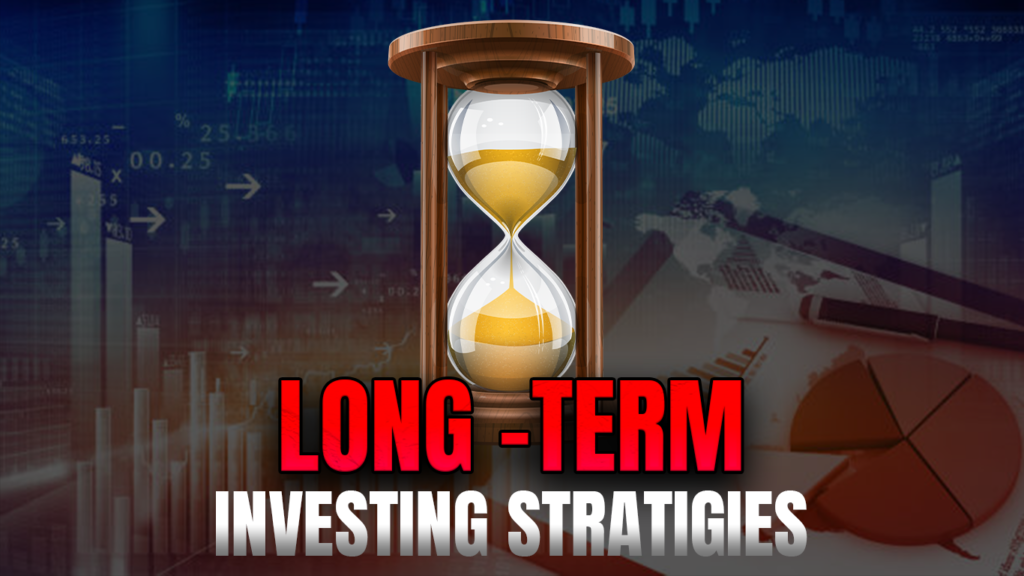Long-term investing is a strategy that involves holding assets for an extended period, typically five years or more, with the goal of achieving financial growth over time. Unlike short-term trading, which focuses on quick profits, long-term investing emphasizes patience, discipline, and the power of compound interest.
Benefits of Long-Term Investing
Compound Interest: One of the primary advantages of long-term investing is the ability to harness the power of compound interest. As your investment grows, you earn returns not only on your initial capital but also on the reinvestment of those returns, leading to exponential growth over time. Risk Mitigation: Long-term investing also helps mitigate the impact of market volatility. While short-term fluctuations may cause temporary setbacks, a well-diversified portfolio can weather downturns and ultimately recover value over the long term.
Wealth Accumulation:- By staying invested for the long haul, investors have the opportunity to accumulate significant wealth. Over time, the steady growth of investments can lead to substantial returns, providing financial security and stability for the future. Setting Financial Goals Before embarking on a long-term investing journey, it’s essential to define your financial goals. Whether you’re saving for retirement, a down payment on a home, or your children’s education, clearly identifying your objectives will help guide your investment strategy.
Research and Due Diligence
Successful long-term investing requires thorough research and due diligence. This involves analyzing market trends, evaluating company fundamentals, and staying informed about economic developments that could impact your investments.
Diversification Strategies
Diversification is key to managing risk in a long-term investment portfolio. By spreading your investments across different asset classes, industries, and geographic regions, you can reduce the impact of any single investment’s performance on your overall portfolio.
Staying Informed
To make informed investment decisions, it’s essential to stay abreast of market trends and economic indicators. This includes monitoring news sources, attending financial seminars, and consulting with trusted financial advisors.
Rebalancing Your Portfolio
Periodically rebalancing your portfolio ensures that your asset allocation remains aligned with your investment goals and risk tolerance. By selling overperforming assets and reinvesting in underperforming ones, you can maintain a balanced portfolio over time.
Tax-Efficient Investing
Maximizing tax efficiency is another crucial aspect of long-term investing. This may involve utilizing retirement accounts such as 401(k)s and IRAs, as well as implementing tax-loss harvesting strategies to offset capital gains.
Avoiding Emotional Decisions
Emotional decision-making can be detrimental to long-term investment success. By recognizing and mitigating common psychological biases, such as fear and greed, investors can avoid making impulsive decisions that may undermine their financial goals.
Patience and Discipline
Long-term investing requires patience and discipline to withstand market fluctuations and stay committed to your investment strategy. By maintaining a long-term perspective and avoiding reactionary behavior, investors can achieve greater success over time.
Examples of Successful Long-Term Investors
Warren Buffett
Warren Buffett, often regarded as one of the greatest investors of all time, is known for his long-term approach to investing. By focusing on fundamentally sound companies with strong competitive advantages, Buffett has built a vast fortune over several decades.
Peter Lynch
Peter Lynch, the former manager of the Fidelity Magellan Fund, achieved remarkable success by investing in companies with which he was familiar and understood. Lynch’s emphasis on thorough research and patience exemplifies the principles of long-term investing.
Common Mistakes to Avoid
Chasing Short-Term Gains
Attempting to time the market or chase short-term gains can undermine long-term investment success. Instead of focusing on quick profits, it’s essential to maintain a disciplined approach and stay committed to your long-term financial goals.
Overtrading
Excessive trading can lead to higher transaction costs and tax liabilities, eroding investment returns over time. By minimizing unnecessary turnover and staying focused on the long term, investors can avoid the pitfalls of overtrading.
Monitoring and Evaluation
Regularly monitoring your investment portfolio and evaluating its performance is critical to long-term success. By tracking your progress and making necessary adjustments along the way, you can ensure that your investments remain aligned with your financial objectives.
Long-Term Investing for Different Life Stages
Long-term investing looks different at various stages of life. Whether you’re a young investor just starting or nearing retirement and looking to preserve capital, adopting a long-term perspective is essential for achieving financial security and prosperity.
Conclusion
Long-term investing offers numerous benefits, including compound interest, risk mitigation, and wealth accumulation. By setting clear financial goals, conducting thorough research, and staying disciplined over time, investors can build a solid foundation for their financial future.

